Was there ever nothing in the universe? What is nothing? That’s what listener Aviva wants to know. We turned to particle physicist Dr. Jessica Esquivel to find out! She takes us on a mind-bending journey to ask what existed before the universe began, and how a quantum dance party might have started the Big Bang! This story about subatomic particles, giant magnets, and quantum physics is something that will blow your mind.
You can find a transcript of the episode and learn more about the particle party in nothing on the blog at sciencepodcastforkids.com
Send us your science questions, ideas and songs to
[email protected]
Support the show by becoming a Patreon member, or making a tax-deductible donation to Tumble Education, a 501c3 organization.
We also have a new merch store! Go get yourself some stuff!
This material is based upon work supported by the National Science Foundation under Grant Number # 2415575 - Culturally Situated STEM Podcasts for Kids.
